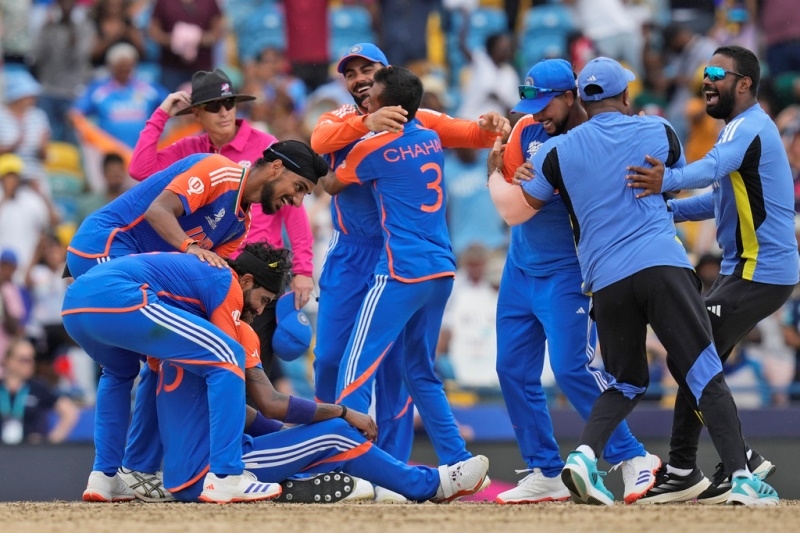- Youth participation vital to BD’s democratic future: C’wealth Group |
- Stocks retreat on week’s first trading day as turnover drops |
- Free education for girls up to honours if BNP wins: Zubaida Rahman |
- Dhaka ranks second worst in world for air pollution |
- Bangladesh stocks end week higher on upbeat mood |
India clinch 2nd T20 World Cup title as Proteas cave

Indian players celebrate their win against South Africa in the ICC Mens T20 World Cup final cricket match at Kensington Oval in Bridgetown, Barbados, Saturday, June 29, 2024. (AP Photo-Ramon Espinosa)
Dhaka, Jun 29: India defended 30 runs when South Africa needed it in 30 balls with six wickets in hand, and they won their second T20 World Cup, ending a 13-year drought for an ICC world title.
This triumph will be remembered for a long time for Indian captain Rohit Sharma and coach Rahul Dravid, who never won a World Cup as a player.
After the match, Virat Kohli, who led the way hitting 76 in the final, declared that it was his last T20 for India.
The victory was orchestrated by a collective effort, with contributions from Virat Kohli's anchoring fifty, and a clinical bowling display, particularly from Hardik Pandya, Jasprit Bumrah, and Arshdeep Singh.
Bumrah, the golden-arm-bowler, conceded only 2 runs in the 18th over and took another wicket. He opened the tail of South Africa, and the rest was done in style by Arshdeep Singh and Hardik.
Electing to bat first, India faced early setbacks, losing Rohit Sharma, Rishabh Pant, and Suryakumar Yadav inside the powerplay. However, Kohli's composed innings, coupled with Axar's aggressive strokeplay, steadied the ship.
While Kohli's 76 runs came at a measured pace, his ability to hold the innings together proved invaluable. Axar's 47 off 31 balls provided the much-needed impetus, guiding India to a respectable 176.
South Africa's chase began on a shaky note, as Bumrah's brilliance removed Reeza Hendricks early. Despite losing Aiden Markram soon after, a blistering onslaught from Heinrich Klaasen threatened to derail India's hopes. Klaasen's 52 off 27 balls, punctuated by towering sixes, brought South Africa within striking distance.
However, the match swung decisively in India's favor when Hardik Pandya dismissed Klaasen in the 17th over. The momentum shifted further with Bumrah's removal of Marco Jansen. Despite needing just 30 runs off the last 30 balls, South Africa crumbled under pressure, ultimately falling short by 7 runs (169 for 8).
The victory sparked jubilant celebrations among Indian players and fans. It marked a triumphant return to the pinnacle of T20 cricket for India, who had last lifted the trophy in 2007.
For South Africa, it was a heartbreaking end to their maiden World Cup final appearance, with the team succumbing to a familiar case of nerves in the crucial moments.
While Kohli's half-century was instrumental, the bowling unit's collective brilliance proved decisive. Hardik Pandya's tight lines and crucial wickets, Bumrah's mastery of the old ball, and Arshdeep Singh's ability to contain the runs in the death overs were instrumental in India's triumph.
Suryakumar Yadav's stunning catch to dismiss David Miller also played a pivotal role in the outcome.
As the final wicket fell, securing India's victory, an outpouring of emotions engulfed the field. Hardik and Virat, overcome with joy and relief, were seen openly weeping, their tears a testament to the years of dedication and the weight of expectations lifted. Rohit fell flat on the ground. In stark contrast, Klaasen, the architect of South Africa's effort of a valiant chase, stood amidst his teammates, his head bowed, the embodiment of heartbreak and desolation.
India's jubilation would reverberate for weeks, but the haunting echo of a missed opportunity would surely linger South Africa for a long time. - UNB

